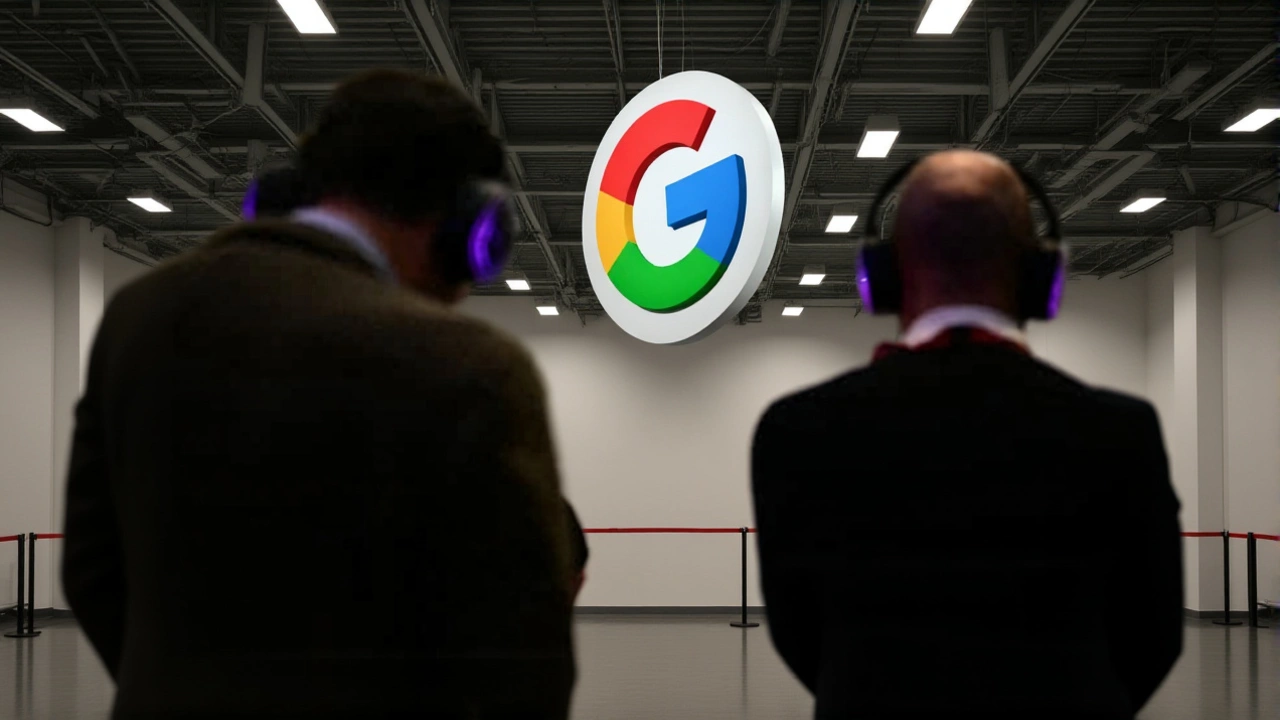After more than two decades of publicly admitting one of his biggest regrets, Warren Buffett has finally bought into Alphabet Inc.. The Berkshire Hathaway conglomerate disclosed on November 14, 2025, that it had acquired 17.85 million shares of Alphabet’s Class C stock (GOOG) for $4.3 billion as of September 30, 2025 — its first-ever investment in the parent company of Google. The move, confirmed in a U.S. Securities and Exchange Commission filing, marks a stunning reversal for the 94-year-old investor who once called technology stocks "too hard to understand." Now, with the AI race heating up and Alphabet’s cash flow outpacing most Fortune 500 companies, Buffett’s team is betting big — and it’s a bet that could redefine Berkshire’s future.
Why This Changes Everything
For years, Buffett and his late partner, Charlie Munger, openly lamented missing out on Google. Munger once said, "Never should somebody give their consumer the opportunity, the incentive to look elsewhere for satisfaction." That philosophy, rooted in loyalty and dominance, perfectly described Google’s search engine — yet Buffett avoided it. He’d passed on Amazon, Apple, and Microsoft too, sticking to banks, railroads, and insurance. But the world changed. AI isn’t just another tech trend. It’s infrastructure. And Alphabet, with its $100 billion in annual cash flow and its own Tensor Processing Units (TPUs), is building the chips that power its own AI models — not just buying them from Nvidia.The timing couldn’t be more significant. Alphabet’s stock surged nearly 40% in Q3 2025 alone, from under $180 to $244 per share. By early November, it hit $285. If Berkshire bought early in the quarter, it may have paid just $3.1 billion for a position now worth over $5.1 billion. That’s a 65% paper gain in under two months — a rare win in value investing.
The Architects Behind the Move
This wasn’t Buffett’s decision alone. While he’s still chairman, he’s stepping down at year’s end. The real driver? Todd Combs, 53, the portfolio manager who runs GEICO and has quietly become one of Berkshire’s most influential investors. Combs, who once joked that "Buffett’s biggest mistake was not buying Google," reportedly pushed for the purchase after seeing how much GEICO spent on Google ads — money flowing directly to the very company Berkshire had ignored for years.And then there’s Greg Abel, 62, the man who’ll take over as CEO on January 1, 2026. Abel, known for his operational discipline, didn’t just approve the buy — he likely structured it. Sources say he’s focused on long-term asset quality over short-term hype. Alphabet’s ability to generate cash while reinvesting heavily in AI infrastructure fits Abel’s playbook perfectly.
Veteran investor Thomas E. Russo of Gardner Russo & Quinn LLC summed it up: "Warren Buffett has backed a winner with his Alphabet wager." Russo pointed out that Alphabet, like Berkshire, has a "mountain of cash" — but added a warning: "The risk is that its $90 billion in 2025 AI spending doesn’t pay back like Search or YouTube did."

What This Means for the AI Race
Alphabet isn’t just another tech giant anymore. It’s a vertically integrated powerhouse. It controls the search engine, the world’s largest video platform (YouTube), the dominant mobile OS (Android), and now, its own AI chips. While rivals like Microsoft and Meta rely on Nvidia’s GPUs, Alphabet designs its own hardware — TPUs — optimized specifically for its AI models. That’s a moat. A deep, wide, hard-to-cross moat.This investment signals more than confidence in Alphabet. It signals confidence in a new kind of tech company — one that doesn’t just sell software, but builds the hardware that runs it. In an era where AI training costs are skyrocketing, control over infrastructure is everything. Berkshire’s $4.3 billion stake isn’t just a financial play. It’s a vote of confidence in a future where the biggest winners aren’t the flashiest apps, but the quiet builders of the underlying systems.
What Comes Next?
Buffett is exiting. Abel is stepping in. The new regime will face pressure to replicate this success. Will they buy more tech stocks? Will they invest in AI infrastructure elsewhere? The market will watch closely. Alphabet’s Q4 earnings, due in January, will be scrutinized for signs that its AI spending is starting to yield returns — especially as competitors like Amazon and Google Cloud ramp up their own chip projects.Meanwhile, Berkshire’s portfolio now includes Alphabet as its 10th-largest holding. It’s the first tech stock in the top 10 since Apple — and the first one Buffett didn’t avoid because he didn’t understand it. He understood it too late. Now, he’s playing catch-up.

Behind the Numbers
- 17.85 million shares of GOOG purchased as of September 30, 2025 - $4.3 billion cost basis at time of filing - $4.9 billion market value as of November 14, 2025 - $285+ Alphabet stock price as of early November 2025 (up 17% since September 30) - $90+ billion projected 2025 capital expenditures by Alphabet - $100 billion estimated annual cash flow from Alphabet’s core businesses - 21 years since Google’s IPO on August 19, 2004 - 12 years since Buffett publicly admitted missing GoogleFrequently Asked Questions
Why did Berkshire Hathaway wait so long to invest in Alphabet?
Buffett and Munger spent decades avoiding tech stocks because they didn’t believe they could predict which companies would dominate long-term. Google’s dominance in search and advertising wasn’t obvious early on, and its business model seemed too volatile. By the time its moat became undeniable — with YouTube, Android, and now AI infrastructure — the stock price had soared past what Buffett considered a "margin of safety." Only now, with a new leadership team and Alphabet’s cash flow proving resilient, did Berkshire see an entry point that justified the risk.
How does this investment affect Berkshire Hathaway’s future under Greg Abel?
Abel’s leadership signals a shift from passive investing to active asset management. While Buffett favored insurance float and dividend payers, Abel is more comfortable with capital-intensive, high-growth businesses. Alphabet’s massive cash flow and controlled infrastructure align with Abel’s operational mindset. This purchase isn’t just a bet on AI — it’s a blueprint for how Berkshire will invest under its next CEO: targeting companies that generate cash while building durable, in-house technology advantages.
Is this a sign that other value investors will follow Berkshire into AI stocks?
Absolutely. Buffett’s stamp of approval carries weight — especially when it breaks a decades-old rule. Value investors who previously avoided tech because of volatility may now reevaluate companies with proven cash generation and infrastructure control. Alphabet’s $100 billion in annual cash flow makes it less speculative than startups. Investors are already looking at Microsoft, Amazon, and even Nvidia through this new lens: not as tech stocks, but as cash-generating infrastructure plays.
What role did Todd Combs play in this decision?
Combs, who manages a portion of Berkshire’s portfolio and runs GEICO, was instrumental. GEICO spends billions on Google ads — money that flowed directly to the company Buffett had long avoided. Seeing that real-world data — how deeply embedded Google was in daily commerce — convinced Combs that the moat was real. He reportedly presented Buffett with the numbers, showing Alphabet’s cash flow and AI progress. This wasn’t theory. It was proof.
Could Alphabet’s AI spending backfire?
Yes. Spending $90 billion in a single year on AI infrastructure is enormous — more than most Fortune 500 companies spend on R&D in a decade. If the returns don’t materialize, or if competitors like OpenAI or Anthropic leapfrog Alphabet’s proprietary tech, the investment could become a drag. Unlike Search, which scaled profitably with minimal marginal cost, AI training requires constant, expensive upgrades. The risk isn’t failure — it’s overpaying for an advantage that becomes commoditized too quickly.
Why is Alphabet’s TPU chip development so important?
Most AI companies rely on Nvidia’s GPUs, making them vulnerable to supply shortages and pricing power. Alphabet’s TPUs are custom-built for its own models, making training faster and cheaper. This isn’t just efficiency — it’s control. By owning the hardware, Alphabet reduces dependency on external suppliers, lowers long-term costs, and gains a competitive edge that’s nearly impossible to replicate. For investors, it’s the difference between renting a car and owning the factory that builds it.
